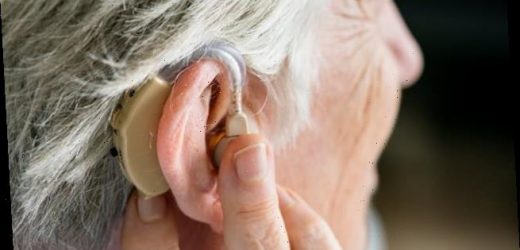Hearing aids can delay dementia onset in people with auditory problems by up to five YEARS, study suggests
- Experts from Northern Ireland studied 2,114 seniors with a hearing impairment
- They looked at who developed dementia five years after a diagnosis of ‘MCI’
- This — ‘mild cognitive impairment’ — manifests as thinking and memory issues
- A third of those using hearing aids had not developed dementia after five years
- Yet this figure was only 20 per cent for those who did not wear a hearing aid
The onset of dementia in people with auditory problems could be delayed by up to five years through the use of hearing aids, a study has suggested.
Researchers from Northern Ireland studied 2,114 patients with a hearing‐impairment, each of whom was over 50, from the National Alzheimer’s Co-ordinating Centre.
The team found that a third of participants who wore hearing aids had not developed dementia five years after their mild cognitive impairment, or ‘MCI’, diagnosis.
In contrast, this figure was only a fifth for those who did not use a hearing aid.
MCI, which manifests as problems with memory and thinking that do not interfere significantly with daily life, affects some 5–20% of people over the age of 65.
It is not defined as a form of dementia. However, individuals diagnosed with MCI are more likely to go on to develop dementia later in life.
The experts said their findings were an ‘important first step’ to supporting a move to encourage people with hearing loss who are at risk of dementia to wear hearing aids.
The onset of dementia in people with auditory problems could be delayed by up to five years through the use of hearing aids, a study has suggested. Pictured: a hearing aid (stock image)
‘We measured the time for progression from MCI to dementia in individuals using hearing aids and those with uncorrected hearing impairment,’ said paper author and data analytics expert Magda Bucholc of the Ulster University in Northern Ireland.
The team, she added, ‘found that use of hearing aids was associated with a two-year slower conversion to dementia.’
‘The percentage of participants who had not developed dementia five years after the baseline MCI diagnosis was 19 per cent for non-users of hearing aids and 33 per cent for those using hearing aids.’
‘Some may say this constitutes a modest finding overall,’ she said.
‘However, in my opinion — given there is no disease-modifying treatment for dementia — even a small beneficial effect of hearing loss treatment in delaying the disease can have significant implications for public health.’
‘In fact, studies show that delaying the onset of dementia by even two years would have substantial economic and societal effects,’ Dr Bucholc continued.
The results, she said, are a key ‘first step in triggering policy changes to encourage people with hearing loss who are at risk of dementia to wear hearing aids.’
According to the researchers, their study is the first to investigate the link between hearing aids and progression to dementia in individuals with MCI.
‘Our results clearly suggest that the use of hearing aids is independently associated with a decreased risk of a dementia diagnosis for MCI patients,’ said paper author Dr Sarah Bauermeister, of the Oxford-based Dementias Platform UK.
‘It is well established that hearing loss is associated with an increased risk of dementia,’ said the Royal National Institute for Deaf People (RNID)’s executive director of research, Ralph Holme.
‘This new research supports the growing view that the use of hearing aids may help slow its onset,’ he added.
‘Further research is needed to definitively show this, but clearly taking early action to address your hearing loss can only be a good thing.’
‘RNID is helping to fund vital research to understand why hearing loss and dementia are linked.’
The full findings of the study were published in the journal Alzheimer’s & Dementia: Translational Research and Clinical Interventions.
WHAT IS DEMENTIA? THE KILLER DISEASE THAT ROBS SUFFERERS OF THEIR MEMORIES
Dementia is an umbrella term used to describe a range of neurological disorders
A GLOBAL CONCERN
Dementia is an umbrella term used to describe a range of progressive neurological disorders (those affecting the brain) which impact memory, thinking and behaviour.
There are many different types of dementia, of which Alzheimer’s disease is the most common.
Some people may have a combination of types of dementia.
Regardless of which type is diagnosed, each person will experience their dementia in their own unique way.
Dementia is a global concern but it is most often seen in wealthier countries, where people are likely to live into very old age.
HOW MANY PEOPLE ARE AFFECTED?
The Alzheimer’s Society reports there are more than 850,000 people living with dementia in the UK today, of which more than 500,000 have Alzheimer’s.
It is estimated that the number of people living with dementia in the UK by 2025 will rise to over 1 million.
In the US, it’s estimated there are 5.5 million Alzheimer’s sufferers. A similar percentage rise is expected in the coming years.
As a person’s age increases, so does the risk of them developing dementia.
Rates of diagnosis are improving but many people with dementia are thought to still be undiagnosed.
IS THERE A CURE?
Currently there is no cure for dementia.
But new drugs can slow down its progression and the earlier it is spotted the more effective treatments are.
Source: Alzheimer’s Society
Source: Read Full Article



